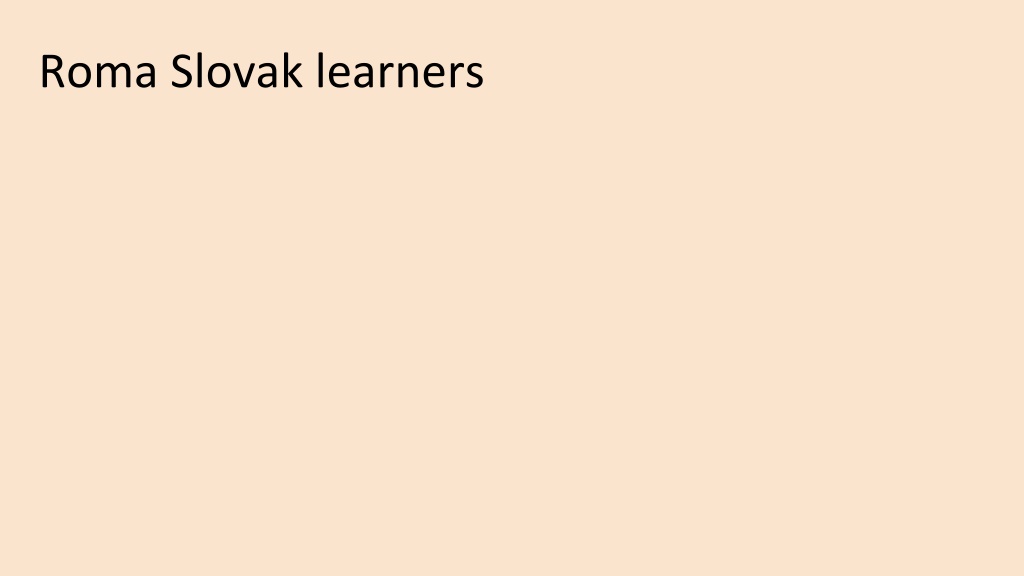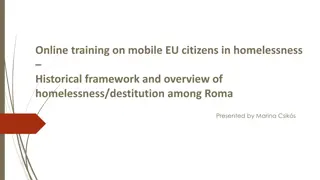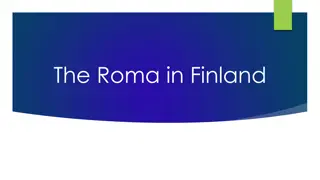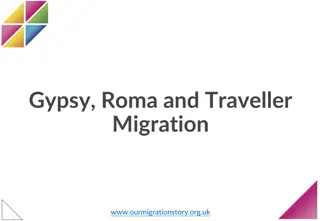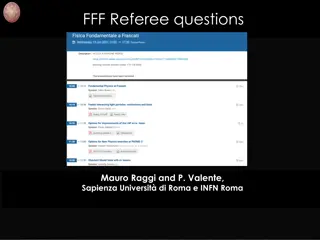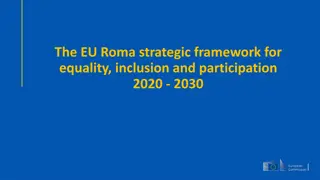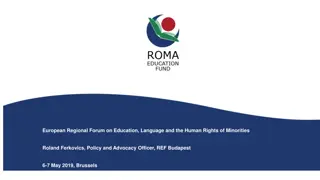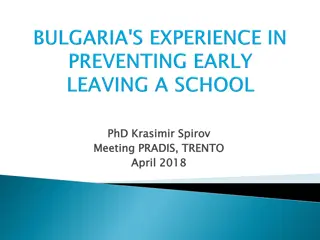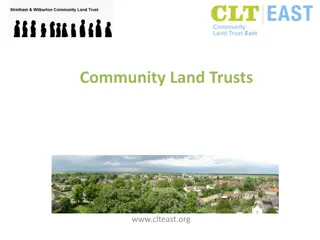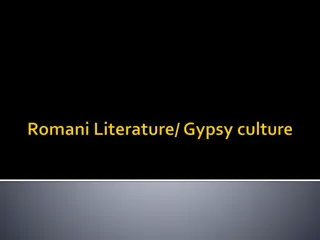Understanding the Roma Community and Educational Challenges
Roma communities face discrimination and challenges in education due to historical persecution and marginalization. It is important for schools to recognize and support Roma children, ensuring equal opportunities for success. Understanding the Roma culture, origins, and educational background can help in creating inclusive environments and meeting the needs of Roma students effectively.
Download Presentation

Please find below an Image/Link to download the presentation.
The content on the website is provided AS IS for your information and personal use only. It may not be sold, licensed, or shared on other websites without obtaining consent from the author. Download presentation by click this link. If you encounter any issues during the download, it is possible that the publisher has removed the file from their server.
E N D
Presentation Transcript
Ethnicity and ascription Minority ethnic group, entitled to protection under the Equality Act 2010 (their ethnicity, culture, language, religion and beliefs need to have due recognition and acknowledgement) Many families from Roma communities choose not to declare their ethnic status to schools for fear of discrimination Schools have a duty to monitor pupil attainment to ensure no group is disadvantaged Data shows Roma pupils do less well than other pupils, but there is no reason why Roma children cannot be equally as successful as other groups
Knowing your Roma community Roma is used to refer to people of Romani origin It is believed the Romani people originate from Northern India who started to migrate between 500 and 1000AD In the UK the term Roma refers to Romani people who settled in Central and Eastern European countries like Romania, Czech Republic, Slovakia, etc. Roma people form the largest ethnic minority group in Europe with an estimated population of around 10-12 million Most Roma people arrived in the UK after 2004 as migrant workers, but some arrived before this time as asylum seekers and refugees Roma communities have a long history of persecution, marginalisation and exclusion which still remains prevalent today
Knowing your Roma community The vast majority of Roma people live in segregated settlements or neighbourhoods In many circumstances Romani people are denied an acceptable level of education High level of literacy difficulties amongst Roma adults who remain a vulnerable group at risk of continued isolation and hostility Roma people experience huge levels of discrimination and racism in their home countries Roma people are not a homogenous group of people Some Roma people choose to wear traditional dress Importance of very strong family unity and a need for domestic cleanliness
Knowing your Roma community Understanding where your Roma children and families are from is essential Knowing whether or not your Roma families live in a segregated community at home, are from an urban or rural area or have received some form of education is very useful Knowing these things will help the school understand the children and community more, support tracking and inclusion and so help meet the needs of the Roma child more effectively
Contextual influences: can be positive or negative Scripts Past experiences Demographic and community influences Education policy Social identity
Constructive conditions Considered as having the potential to raise the educational outcomes of GRT pupils, the contextual influences focus more widely and therefore display characteristics that may either have positive of negative impacts on the educational outcomes of GRT pupils. Safety and trust Respect Access and inclusion Flexibility High expectations Partnership Teachers personal beliefs towards Roma pupils, as well as the changes in school and in teaching methods caused by the influx of Eastern European Roma pupils, are considered to be another influential constructive condition that is not included in the model. Alba and Holdaway 2013: attainment gaps between pupils from different ethnic backgrounds can only be closed if teachers share the same expectations and responsibility for all students.
Educational outcomes Emphasises the main schools interest with a GRT cohort: raising the GRT pupils achievement in school, as well as ensuring their personal growth and wellbeing. Retention Attention Transfer and transition Attendance Engagement Progression Enjoyment Health and wellbeing
Induction Roma families really notice when a school is welcoming and helpful; this doesn t happen very often in the Czech Republic David Pongo, Czech Roma undergraduate Like any parent, Roma parents put a great deal of trust in schools and school staff to provide a safe environment for their children to learn For many Roma families previous experiences with authority figures have been very negative: they may have been denied their basic human rights and faced open hostility and discrimination To put their trust in schools may take some time Developing, maintaining and fostering this relationship is critically important Using an interpreter is important so communication is clear A home visit can help establish a trusting relationship
Induction Demonstrating a commitment to collaboration and co-operative working The first meeting sets the tone and influences of how the partnership develops Roma adults will appreciate teachers who greet them in a way that conveys honesty, genuine warmth, respect and understanding Talk openly with parents, reassuring them and explaining school expectations in a way that demonstrates the shared concern for the welfare and progress of the child Induction meetings are an opportunity to find out as much as possible about the child and what their strengths and interests are Highlight the expectations of the school from the outset. Many Roma families may be unfamiliar with the subjects taught and what is expected of them and their children. Making sure parents and carers know from the outset the expected level of attendance at school is important An induction film/ welcome pack in the appropriate language
EAL Vast majority of Roma pupils will be EAL Show an interest in the Roma child s mother tongue, country of origin, hobbies and interests will help Find them a buddy Sit them close to the teacher and provide basic classroom material Involve them in every activity as they will learn some skills from observing other children Visual prompts Regular targeted interventions in small groups for focussed language work Lots of opportunities to listen to chatty children
Learning environment Possibility of previous negative experiences means that it is essential to make the classroom environment as positive and affirming as possible Use of appropriate resources and displays that reflect the cultures of all children, including those within the Roma community, can help challenge myths surrounding them and serve to promote community cohesion An inclusive curriculum prepares all pupils for life in a diverse society Some Roma pupils may experience conflicting expectations between home and school. Some secondary age pupils may perceive school to be a limiting environment compared to home where they are treated as adults from puberty Providing appropriate conditions for homework in school can be helpful if pupils do not have access to ICT or have limited space
Developing effective outreach work: essential home-school liaison Maintain positive relationship of trust Demonstrating that the welfare and attainment of their child is of the utmost important Many Roma adults feel uncomfortable in the school environment and will only contact the school if they have a problem Not forgetting to communicate good news and success is important Some parents may have concerns about participation in school trips and off-site education. Being flexible and taking the time to talk and reassure parents will encourage wider participation Sex education may be an issue for some parents and should be discussed prior to teaching
Working effectively in a multi-agency context Newly arrived families often face multi-occupancy in overcrowded poor housing dwellings with other family members for long periods of time. Families do not choose to live this way but are forced to pool their resources to maintain a roof over their heads Serious financial difficulties can lead to abject poverty Registering with a GP and dentist can be major challenges due to language barriers Once children are in school, schools themselves become a real source of support If schools have strong links with wider services and agencies his can help enormously Drop-in sessions for families can be highly successful, especially if they are supported by a community member Ethnic Minority Achievement Service, Traveller Education Team, Citizens Advice Bureau, welfare rights officers, youth service, local neighbourhood team and voluntary sector organisations may all be of benefit In Derby, local churches are used as after-school provision due to a growing concern over the numbers of Roma children on the streets after school. Pupils were fed and given activities based on their curriculum subjects. Volunteers were drawn from the church, the multi-faith centre base at Derby University, local Roma volunteers and community organisations. The result was that these Roma pupils were engaged in purposeful activities after school. However, the project had no funding from the local authority.
Empowering the community As with any ethnic minority group, allowing the community to have a voice and contribute to school life in some way can prove invaluable Welcoming Roma volunteers into school? Encourage parents to come into school Creating opportunities or informal coffee morning to get to know parents (and parents to know each other) Encourage Roma representation on school council and governing bodies Create Roma community liaison officers Showcase good news and seek to create positive Roma role models GRT history month
Raising Roma pupils attainment in tests and examinations Even in schools where Roma pupils make rapid progress, the attainment gap remains wide, especially for pupils who arrive late into the English school system Robust tracking of pupil progress being backed up by accurate monitoring of different groups of pupils. Emphasis was on making sure that teaching was good or better. In Manchester schools, Ofsted has found no evidence that the arrival of Roma pupils in these authorities has had an adverse effect on the attainment of other pupil groups.
The role of schools and teachers is fundamental in breaking the cycle of poor educational outcomes for Roma children across Europe. By having a greater understanding of these new Roma communities in the UK and by a concerted effort by schools, parents and the young people themselves, a brighter future awaits, one where every child matters.
History specific The GRT communities have a rich history of oral history The bottom line: encouraging creativity in all learners, regardless of their background As historians we are all passionate for preserving, remembering and sharing the past. It is therefore integral we do the same for the Gypsy, Roma and Traveller people.
Oral history The GRT communities have a rich tradition of oral history https://www.travellerstimes.org.uk/sites/default/files/inline-files/How%20to%20.....gather%20some%20Oral%20History.pdf
Research Encourage learners to research their own history and use it within lessons https://www.travellerstimes.org.uk/sites/default/files/inline-files/Heriatge%20research%20tool%20kit.pdf
Resources Searching for the Travelling People A documentary Society s dropouts ancient traditions, cultures and language. Gypsies have been in Darlington for 200 years, and Britain since 1450. https://www.youtube.com/watch?v=3ID-3rjKD0c Roads from the Past, a short film https://www.youtube.com/watch?v=1bhBbMrF8Z0
Local organisation websites https://www.leedsgate.co.uk/about-us - Leeds Gypsy and Traveller Exchange - a community organisation set up to improve the lives of and support GRT people living in Leeds. This includes supporting literacy and numeracy skills amongst adults and young people https://yorktravellerstrust.wordpress.com/ - York Travellers Trust - charity set up to provide support and advice for the GRT community in York. The Trust also runs Cultural Competency Training to help improve understanding of the community and form relationships with the community. http://www.nationalgypsytravellerfederation.org/ - The National Federation of Gypsy Liaison Groups - charity set up to promote inclusion of GRT people. The charity works to do this through educating the public, providing details of network groups and coordinating opportunities for GRT people to engage with service providers in the UK.
History specific websites and resources https://www.gypsy-traveller.org/heritage/celebrating-gypsy-roma-and-traveller-history-month/ - Information about GRT History Month (June) https://travellermovement.org.uk/campaigns/gypsy-roma-and-traveller-history-month - Further information about GRT History Month https://rtfhs.org.uk/ - Archival website collated by GRT people for families to research their roots. Led by Janet Keet-Black, who has collaborated with the BBC. https://www.proudgypsytraveller.co.uk/violet-cannon/ - Blog run by Violet Cannon, an English Gypsy, who has set up many initiatives to encourage understanding of the GRT community. https://www.travellerstimes.org.uk/heritage - Individual stories and photographs about GRT families http://c9444149.myzen.co.uk/?page_id=10 - Resources for tracing family roots, including censuses, birth/marriage/death databases, biographies of notable GRT families and research guides. https://www.bbc.co.uk/programmes/b0bty2w8 - A Very British History: Romany Gyspies on BBC iPlayer (accessible through Box of Broadcasts with uni account) presented by Damian Le Bas, a writer of Romani descent who went to Oxford University. The documentary focuses on the GRT community in the 1960s, a pivotal period for the community due to the 1968 legislation compelling local councils to provide permanent traveller sites. It also explores GRT culture. http://romanygenes.com/gypsies-romany/4522151027
Select bibliography The Stopping Places: A Journey Through Gypsy Britain by Damian Le Bas (2018). - Critically acclaimed text about the stopping places used by the GRT community in Britain for centuries. It provides insights into the GRT community and their history, and it is semi-autobiographical. Le Bas is one of a few GRT people who have attended university, and he was also the editor of the first GRT newspaper, the Travellers Times. The Gypsy Countess by Anne-Marie Ford (2018) - Biography of Catherine Cox, a 19th C. Romany Gypsy who married the Earl of Stamford and Warrington. A more well-rounded account of her life and her family. Gypsies of Britain by Janet Keet-Black (2013) - Introduction to the history of GRT English, Scottish and Welsh people by the Honorary VP of Romany and Traveller Family History Society (RTFHS), from 1500 to present day. Specific focus of GRT involvement in serving the country. The Winchester Confessions, 1615-1616: Depositions of travellers, Gypsies, fraudsters, and makers of counterfeit documents, including a vocabulary of the Romany language ed. Alan McGowan (1996). - This short pamphlet provides an insight into the GRT community during the Jacobean period. It also contains the earliest known record of the Romany language in Britain, bar small snippets from c. 1547. Romany Routes - quarterly journal published by the RTFHS. - Contains information to help with researching ancestors, social history snippets and photographs. All written by members of the GRT community.
WWI specific resources https://www.britishpathe.com/video/hulls-vc-private-cunningham-enjoys-well-earned - Video of John Cunningham, Roma gypsy from Scunthorpe, who received the VC. http://www.eastsussexww1.org.uk/gypsy-traveller-community-ww1/index.html - GRT in Essex. https://rtfhs.org.uk/tracing-your-ww1-ancestors/ - Tools for researching GRT relatives who served in WW1.
